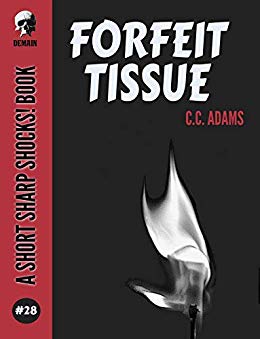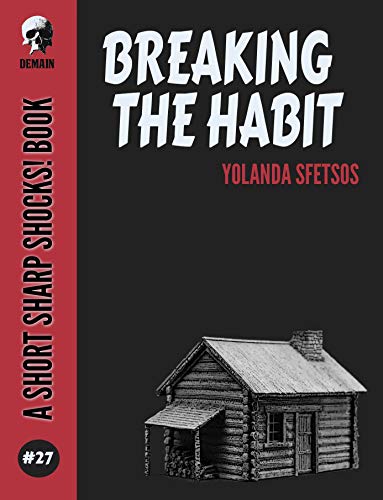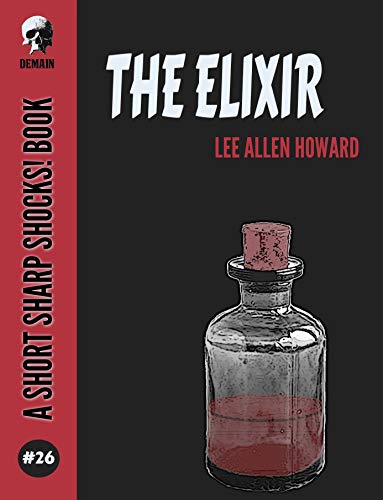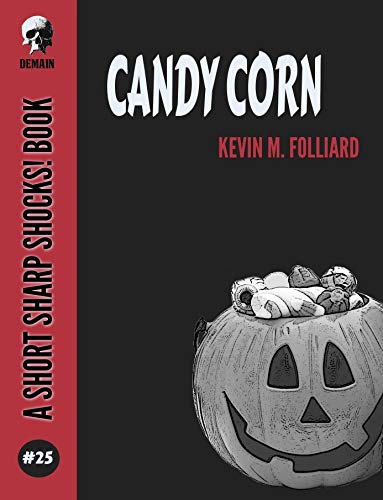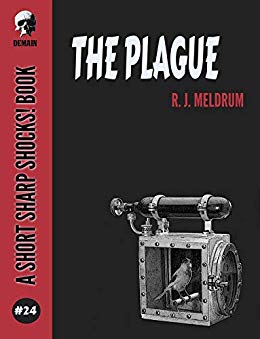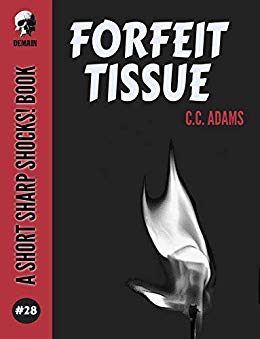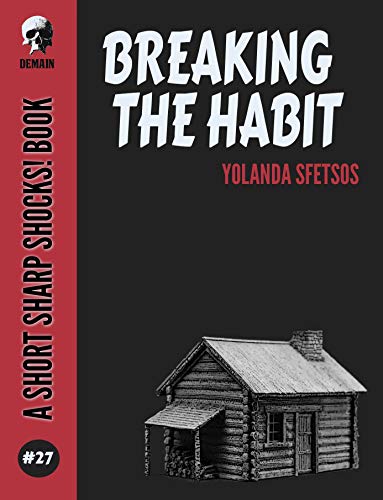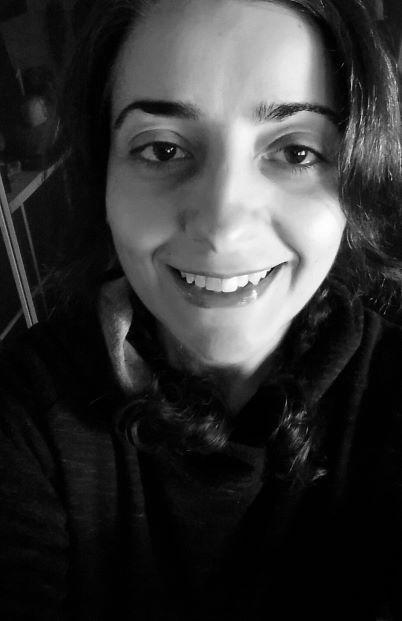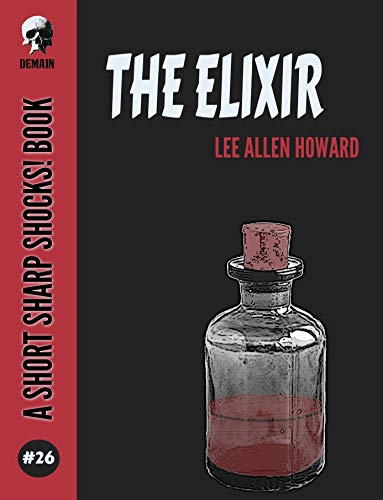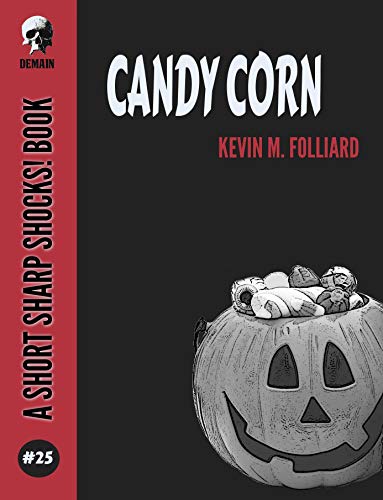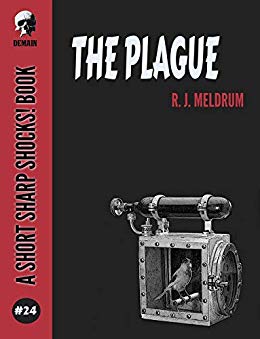|
|
|
Congrats to C.C Adams whose Short Sharp Shocks! Forfeit Tissue - Book 26 - is released today in ebook on Amazon for only 99p.
Check it (and the other 27 books in the series!) out. https://www.amazon.co.uk/Forfeit-Tissue-Short-Sharp-Shocks-ebook/dp/B07VB4QP7W/
0 Comments
Congrats to Yolanda Sfetsos whose Short Sharp Shocks! Breaking The Habit - Book 27 - is released today in ebook on Amazon for only 99p.
Check it (and the other 27 books in the series!) out. https://www.amazon.co.uk/Breaking-Habit-Short-Sharp-Shocks-ebook/dp/B07V9ZJGG5/ Congrats to Lee Allen Howard whose Short Sharp Shocks! The Elixir - Book 26 - is released today in ebook on Amazon for only 99p.
Check it (and the other 27 books in the series!) out. https://www.amazon.co.uk/Elixir-Short-Sharp-Shocks-Book-ebook/dp/B07VD6RV2C/ Congrats to Kevin M. Folliard whose Short Sharp Shocks! Candy Corn - Book 25 - is released today in ebook on Amazon for only 99p.
Check it (and the other 27 books in the series!) out. https://www.amazon.co.uk/Candy-Corn-Short-Sharp-Shocks-ebook/dp/B07V9H5LSD/ Congrats to R.J. Meldrum whose Short Sharp Shocks! The Plague - Book 24 - is released today in ebook on Amazon for only 99p.
Check it (and the other 27 books in the series!) out. https://www.amazon.co.uk/Plague-Short-Sharp-Shocks-Book-ebook/dp/B07V9VZGB1/ Demain has wanted to work with C.C. Adams for a while – the Short Sharp Shocks! series has facilitated that with his story Forfeit Tissue. A little while before publication, Dean interviewed Mr Adams... DEMAIN PUBLISHING: Hey C.C. great to talk to you about Forfeit Tissue, loved the story! Can you tell us a little about it? C.C. ADAMS: Absolutely – thanks, man. This one’s a reprint from a story a couple of years or so ago, originally in Crossroads In The Dark, Vol. 2: Urban Legends, from Burning Willow Press. They’d already had a story from me in Vol. 1 around morality, but for the second volume, they wanted longer submissions – novelettes in this case. It had been a while since I’d written longer pieces, so by this point, I wanted to flex again; show how my craft had evolved. What was fortuitous is, around this time, the Jazz Café was closed for refurbishment/refit or some such. Now, I'd been up there every so often to catch a live act, like Maceo Parker or the Average White Band etc. It's always been a tightly-packed venue: shoulder-to-shoulder. Dim, funky and lively…and a far cry from the opening scene in the story. One vision I had for a story was that scene, and what our protagonist sees soon after. So from that one tableau, and the Jazz Café’s real-life closure, I just crafted the narrative around it. DP: Yes, I’ve always wanted to go there but haven’t had the time...I could tell that a lot of research had gone into the story (and that’s a compliment don’t worry) – were there any challenges you faced when writing Forfeit Tissue? CCA: Challenges? You know, now I think about it, there were a few! Sure, I settled on one particular urban legend – one that fit with the tableau I first had in mind for the story. Aside from online research, which is often a good place to start, I did some leg work and visited a couple of places for info. Chelsea & Westminster Hospital for one, which, sadly, wasn’t helpful. London Fire Brigade, on the other hand? They were great. I mean, I live within walking distance of a station and they opened their door to me – but they didn't have to. Good guys. Invited me in for a sit-down and chat. Hashed out all the details, all the procedure. Went back about a year later and presented them with a signed copy of the anthology. For me, those are the kinds of wins that make what I do cool. You put in work, and people read the finished product. Or even if they just see it, and it piques their interest. That’s cool too. DP: Oh definitely and hats off to the Fire Brigade for spending some time with you. They do a great job and are often ‘forgotten’ about – once Forfeit Tissue hits paperback in a few months we’ll have to drop another copy off to them...so when you were writing the story were any of the characters based on you or real events in your own life? CCA: I’m more likely to be Rashid – the voice of reason, as it were. The narrative or scene which sets the tale off is from countless visits to the Jazz Café. Note that how it’s described in the story isn’t how it looks now – certainly not how it looked the last time I went in, which was maybe in the last couple of years. The general set-up is still the same: a small, close-packed venue. Low stage, where you can get close to the acts. And I’ve spent time in there, seen a number of acts. Rakim, Wu-Tang Clan’s GZA, Roy Ayers, Amerie, Souls Of Mischief. The ones I’ve seen there the most would be Maceo Parker, and the Average White Band. But, lots of memories from there. Many a cold Becks downed in that place. DP: I bet and I can’t wait to check it out. For those that aren’t familiar with your work, would you say you had a specific style at all? Anything you find particularly challenging when you write? CCA: I don’t know I have a writing style as such. I do know that I will write a story how I’d tell it to you. So the language of the story is gonna be vivid, relaxed, articulate. Paced. Nuanced. There’ll be elements of horror, but there are also those quiet moments, where actions and ramifications start to weigh on a character. I love that stuff: because this is where horror can really weigh on someone. Those moments where they have time to think: maybe too much time that they’re spending in their own head. As for what I find particularly challenging in the writing? Finishing the draft. There are those authors who can’t write without background noise, but I’m not one of them. Not only do I need quiet, but solitude as well. I don’t want people around me at the best of times. Once I get that quiet and solitude? The challenge is to knock out a complete draft before the muse gets bored. DP: Yeap, I can write with some background noise (of my choice I must add) but do love a bit of piece and quiet...so who are your influences? Did you / do you have a mentor? CCA: Authors and books. The first nod goes to Aidan Chambers from way back when, because his collection of Ghosts & Hauntings was probably the book that pushed me over the edge. (Does anyone remember Aidan Chambers?) I read that when I was about 11, and I’ve had a love of dark narrative ever since. These stories were available for all ages, including children, but they didn’t pull any punches. Hauntings were disturbing and malevolent. Other creatures of horror weren't just terrifying, they were violent. Back then, horror stories were eerie, rather than bloody or gory – none of this ‘creepy’ business. That’s generally the feel in my work, what I try to bring to the table. Sure, there may be some gore or viscera, but I prefer a feel of eerie. Insidious menace. Nuance and pacing – all that good stuff. I guess the biggest influence from an author point of view would be Michael Crichton. Yes, I love the man’s work: Jurassic Park, Disclosure, Timeline, Prey – those are my favourites. What I like about Crichton’s work is not only the sense of suspense and action, but the way he weaves a scientific rationale into his work. And it’s done seamlessly. That, I love: that you can do that level of research and blend it into a story, and make something that good. Mentor? I’d have to cite Ian O’Neill for that one. Even from my earliest days starting out as an author with a professional mindset, Ian had been there. Didn’t matter if he had bags of time to spare or not: he’d always spare some. Always some piece of advice, or suggestion. And the one thing that sticks with me is when he’d say, “now go write something.” His way of signing off, as much as anything else, but it sticks with me. And I love him for that. DP: I’ll be honest I’ve not heard of Aiden Chambers but will put that right...and definitely get what you mean regarding Michael Crichton – he can certainly tell a story...what are you working on at the moment, anything you can share? CCA: More novellas are due out, most likely released by the end of the year. My current leaning as an author and reader is toward long fiction, rather than short stories or collections of them. The next story to work on is a novella: one that will reference modern dating in the narrative – Tinder and such. The one after that will be a novel. Both of those works – like most of what I write – are set very much in the real world, but lean toward the supernatural. DP: Would you say you’ve ever suffered from writer’s block? CCA: Not really, no. I’m aware that it’s something other authors may have to contend with, but it’s never been an issue for me. I’m grateful that the muse is always outrunning me. I come up with ideas faster than I can write them, so it's enough of a challenge to write fast enough to keep up with the imagination. As soon as I get the idea, I write it down. DP: So you outline? CCA: Always some degree of outline, even if it’s as basic as an elevator pitch. The main thing for me when I start is to have the elevator pitch and the ending in mind. From there, especially for longer fiction, I’ll flesh out maybe a 2 – 3 page synopsis of what'll happen in the story. Not enough detail to paint myself into a corner, but enough to serve as a guideline to get the first draft down. And with enough wiggle room to allow for some improv and fluidity as well. DP: Favourite gente? CCA: Ahhhh, definitely horror. Or, at least dark fiction. For me, that’s where you get a really suspenseful narrative. Why? Because there’s no guarantee that all the players get out alive. And even if they do, there’s a chance the monster gets away as well. I remember watching Halloween back when I was small and Afro’d. I didn't necessarily see Halloween as the best horror film, but when Loomis looks over the balcony after shooting Michael, but sees no body? That has always stuck with me. And those are the kinds of tropes I love to play with. Anything can happen to anybody. DP: Yeap that’s brilliant isn’t it – I love those original Halloweens, though will add (don’t shoot me anybody) that I do love Rob Zombie’s take on the mythos...did you learn anything from writing Forfeit Tissue? CCA: The benefit of research, for one – the challenges of doing research, for another! Especially the research done outside of rummaging around on the Internet. Plus, the evolution of process. From when I first wrote stories – admittedly short stories – they were relatively simple, and I wrote what I knew. Now there are other themes I want to explore and weave into my work. So that takes research, and that takes time. The devil is in the detail, so you wanna make sure that you get the authenticity, because those who know will spot any inconsistency like a sore thumb. But that’s part of the joy, I guess: the idea that you can take a factual rationale from medicine, law, or whatever, and weave it into a dark narrative. DP: Indeed...so, go on, I know you want to: pitch me Forfeit Tissue. CCA: A young man survives a fire…much to the disgust of something else. DP: Nice. And let’s try: if you were writing a synopsis for a newspaper... CCA: Omar counts himself lucky to be alive. A young man who enjoys music and life, his love of the former having jeopardised the latter. Still, he considers himself lucky. Until he meets his judge: a vengeful entity that decides Omar has much to answer for. And suddenly, Omar doesn’t feel so lucky anymore. DP: I love that – okay, final question (promise!) tell us something which they might not know about you... CCA: Apparently I’m a good cook and a good baker. Not only that, but I’m what you'd call a feeder. I find it a chore to cook for me (so I might go with canned fish or deli chicken), but I won’t bat an eyelid when it comes to cooking for other people. Avocado chicken, fajitas, those are the mains. Lime cheesecake is the speciality dessert. With a nice line in white chocolate and lemon shortbread as well. The last HWA get-together, Peter Mark May tells me he liked the last novella. And then he tells me off the back of it that he could tell I wrote it. Why? Because there was a lot of food in there, and people eating…smart-ass. Ha ha! Brilliant – I wouldn’t mind checking out your lime cheesecake in the future – perhaps we’ll invite Mr Peter Mark May to join us too – I’ll bring the wine. Thanks a million for your time – a pleasure talking with you – all the best with Forfeit Tissue! If you would like to connect with C.C. direct: Website: www.ccadams.com Twitter: www.twitter.com/MrAdamsWrites Facebook: https://www.facebook.com/C-C-Adams-861845807189807/ Photo By Clem Onojeghuo, www.clemono.comBook 27 in the Short Sharp Shocks! series is Yolanda Sfetsos’ Breaking the Habit. Dean and Yolanda recently talked about it...
DEMAIN PUBLISHING: We really loved Breaking The Habit here at Demain... YOLANDA SFETSOS: Thank you so much! I’m very excited about being included in this very cool series alongside so many great authors. DEMAIN PUBLISHING: You’re welcome. Can you tell your readers a little more about it? YS: I’m a huge horror fan, so I love reading and writing about all kinds of monsters. One of those monsters happens to be the werewolf. Late last year, I found a picture online featuring a screaming she-wolf wearing white, and as soon I saw it—Isla’s [the lead character] plight to escape her past popped into my head. I wanted to write my own version of a familiar monster, with plenty of violence and a lot of heartbreak. DP: I love how creatives receive inspiration. Like you it can be a picture or a song or a sentence...what were the kind of challenges you faced when writing it? YS: Like all my other stories, the biggest challenge is doing the initial idea justice. It’s very easy for me to see an inspirational pic and come up with an idea that sounds like the coolest thing I’ve ever come up with. But when I sit down to actually write, it just doesn’t come together like I imagined. This happened a few times with this story, but for the most part everything flowed as well as I’d hoped. DP: Nice one! Would you say any parts of the story were based on your own life? YS: Luckily, none of the horrible events that happen to Isla and Cisco are based on events in my own life. Everything is pure fiction. Well, except that when my husband and I got married, we did stay in a lovely cottage in the middle of nowhere… DP: And your writing style? YS: My writing style is getting the story out of my head and on to the screen as soon as I can. LOL. I let the characters guide me through the story and work obsessively on a first draft until it’s written. The most challenging thing about this kind of writing is that during the revision process, there’s more work involved. But I don’t mind. This is what works for me. DP: And if it isn’t broke, don’t fix it – so the saying goes. Who influenced you? YS: I’ve been writing since I was a teenager, so the authors that influenced me the most were S.E. Hinton with her ability to tell a warts and all story about real characters, Clive Barker with his highly imaginative and visceral tales, Stephen King for not being scared to delve into the darkness in the average person, and Mary Shelley because reading Frankenstein changed my life. DP: I love Frankenstein – in fact I wrote my A-Level thesis about that and James Herbert’s The Magic Cottage...anyway, anyway – what next – what are your current projects? YS: Right now, I’m working on several projects: a bunch of YA horror novels I have to revise, an adult gothic haunted house novella that I’m really excited about, a demonic-possessed novel that needs revision, and I have a few dark thriller ideas I’d like to try. I’m always working on something. DP: A lot on – great to see you are busy. I assume then that you don’t suffer from writer’s block? YS: When I suffer from writer’s block it’s usually because I’ve got TOO many ideas begging for my attention at the same time. Sometimes real-life stuff definitely gets in the way, as well as too much clutter. DP: So when you start getting the ideas you put together an outline and work from that? YS: I’m not much of an outline writer. I can’t write a story knowing every single detail that’s going to happen. Instead, I take a LOT of notes before starting a project. I let my mind focus on everything about the idea and write down what comes to mind. The more I jot down, the better the story develops and I know just when to start. After that, it’s just a matter of sitting in front of my laptop, getting started, thinking about the story all the time, and taking more notes. DP: Which is your favourite genre and did you learn anything from writing Breaking The Habit? YS: I LOVE writing dark stories about average people getting on with their lives and discovering they might not be that average after all. I also enjoy telling monster stories. So my favourite genre to write is horror, in its many incarnations. I learned something from this story that I pretty much already knew—you can’t run away from your past. It always catches up with you. DP: True...true. So, if you had to pitch to a film producer... YS: A couple celebrating their honeymoon in the middle of nowhere find out that isolation can sometimes cause secrets to bubble to the surface, and lead to blood-drenched horror. DP: Great – and if you were writing a synopsis for a magazine... YS: Isla wanted to enjoy her honeymoon relaxing on the beach and enjoying cocktails with the love of her life. Instead, she ended up in the middle of the woods inside a cozy cabin, where the past she worked so hard to bury can find and expose her to the beast she’d been desperately trying to escape for years. Now, what should be the best night of her life turns into a bloody fight to stay alive. DP: And finally, can you tell us something your readers might be surprised to find out about you? YS: They might be surprised to find out that while I’m a huge horror freak, I don’t like bleak weather and prefer daytime. I’m a summer person and love sunny days. Don’t we all! Thanks so much for the chat Yolanda and all the best with Breaking The Habit! If you would like to connect with Yolanda direct: Website: www.yolandasfetsos.com Twitter: https://twitter.com/yolandasfetsos Goodreads: https://www.goodreads.com/yolandasfetsos Short Sharp Shocks! Number 26 is The Elixir by Lee Allen Howard – published on the 26th July. Recently Dean and Lee sat down to talk about this nasty (in a good way!) and unsettling story.
DEMAIN PUBLISHING: Hello Lee, welcome to the Demain family. Can you tell us about The Elixir. LEE ALLEN HOWARD: Sure. The story is about desperation and what people will do to free themselves from addiction. I’d had the idea of an old woman asking a young man to do her a favor. As part of an online writing class, I developed the idea into the story. DP: And what a great story it is, I certainly felt for your main character...did you have any particular challenges when writing The Elixir? LAH: Although I’ve never suffered from an addiction disorder, I’m obsessive, so I identified with the protagonist Pauly in getting what he desired most. DP: That certainly comes through the prose so well done – would you say that you have a specific writing style? LAH: I try to write well-structured stories that are character-centered. I wanted the story to have somewhat of a gritty, noir feel to it. My challenge was to keep readers interested and include a nice twist at the end. DP: As a reader my interest was certainly kept until the end, I was dying to know what happened (words chosen purposefully)...who were / are your influences? LAH: As an adolescent, I was electrified by Thomas Tryon’s The Other and James Herbert’s The Rats. These two books made me want to be a horror writer. I like early Stephen King because his characters are fascinating and his prose so readable. And anything by Ramsey Campbell for his ability to disorient and unsettle readers. I consider them, along with Donald Westlake, as mentors for my writing career. DP: Never read Tryon so will check out his work and I love The Rats though probably my favourite Herbert is either The Fog or The Magic Cottage...are you working on anything new right now and can you tell us about it? LAH: My current release is The Bedwetter: Journal of a Budding Psychopath, a horrific psychological thriller about a young man searching for a victim to shave bald. And my work in progress is tentatively titled Dead Cemetery. It’s a horror/gay romance in which the dead return to abduct the living. DP: Dead Cemetery sounds very appealing – would love to read that when it’s finished...I promise to check out The Bedwetter but even the title is making me feel uneasy ha ha! Are you a writer who outlines or just goes for it? LAH: I am a big believer in outlining. I’ve never written more than a scene without first plotting the story and then outlining it. This keeps me on track as I write. DP: Whatever works...finally sir, please tell us something your readers might be surprised to discover about you? LAH: I have a master’s degree in biblical studies and I pastored a Pentecostal church for three years. You learn something new every day! Thank you Lee for your time. If you would like to connect with Lee Allen Howard direct: Website: http://leeallenhoward.com Twitter: @LeeAllenHoward Instagram: @LeeAllenHoward1 Facebook: https://www.facebook.com/LeeAllenHowardauthor/ Book 25 in the Short Sharp Shocks! is Kevin M. Folliard’s Candy Corn. Prior to publication (26th July) Dean and Kevin sat down and talked about it.
DEMAIN PUBLISHING: Hello Kevin, can you tell your readers something about Candy Corn? KEVIN M. FOLLIARD: I always write a Halloween horror story in October and a Christmas horror story in December. Candy Corn started out as a vague premise and quickly shaped into an image of the title character. The rest of the story kind of fell into place around her as I explored what she was doing and why she was doing it. For me, this story is mostly about how people cope with grief. [The character of] Blake deals with the loss of his father by diving into a fictional show that they shared. That works as a coping mechanism, but it unfortunately also makes him vulnerable to his captor. Mrs Cornfield, as the reader eventually learns, has a different kind of grief for failed expectations from her marriage and family. There’s a kind of desperation in how people cope with loss, and that comes alive for everyone involved in this literal desperate situation too. As a holiday story, it also interested me how Halloween reflected the desires of the characters, how they’re all in some way trying to ‘dress up’ or force alternate identities or alternate realities, and how sinking into those roles can work either for or against them. DP: I definitely agree with what you say about the characters dealing with their grief (obviously in different ways) and believe you have been very successful in that. Did you face any particular challenges when writing the story? KMF: First and foremost, Candy Corn ended up being a much longer story that I had set out to write, so that’s always kind of a blessing and a curse. It’s also essentially one long, sustained scene, much like a one-act, one-set theatrical play. While that’s true to the situation Blake is in, as an author, you also have to keep that interesting, so the reader isn’t getting tired of being trapped in a basement the whole time. As the story came together, I found myself taking inspiration from Edward Albee’s play Who’s Afraid of Virginia Woolf, which has very strong characters and dialogue that help keep the audience riveted. I tried to think of the story a bit like a play, and ask myself, “Will a reader want to sit through this whole story in one sitting?” DP: I love Albee’s work! I was lucky to see Patrick Stewart in Woolf – outstanding performance and Eddie Redmayne in The Goat, or Who is Sylvia? He was sublime...is any of Candy Corn based on events in your own life? KMF: Fortunately, nothing quite like this has happened to me! However, I do identify with some aspects of the characters. I can appreciate Blake’s struggles with loss and being one of the ‘outsider’ kids. I think Blake is a creative kid who tends to dive into amateur film projects and his fan-boy obsessions, which I certainly did a lot of growing up. I can even relate to Mrs Cornfield’s shattered life expectations regarding marriage and family, but luckily, I haven’t gone down quite as dark a path as a result! DP: For those readers who aren’t yet familiar with your work, would you say you have a specific writing style? KMF: I think I tend to have more of a lean and direct style of prose, so at times I struggle with knowing when it’s time to slow down and paint a scene, a moment, or an action more vividly. Having test readers is a really important part of my process, because it gets me outside my head and shows me what readers see. I’m lucky to have two excellent writers groups in my community that helped a lot with this story in particular. DP: That really helps some writers...which authors / books influenced you? KMF: My favorite book is J.R.R. Tolkien’s The Hobbit. I really admire Tolkien’s world-building and that book’s brisk, adventurous tone. I think Stephen King would probably be my ‘writer mentor.’ King’s ideas on writing really resonate with me. I like his analogy of a story as a “found artifact,” in which the writer is excavating and preserving it in words, but not quite in control of what it is. DP: I’ve said in other interviews that (sadly) I’m not a MASSIVE fan of King but when I like a book I can’t get enough of it...The Dark Half is definitely my favourite...so, what’s next for you? KMF: I have a number of projects in development. I’m currently seeking a home for a dark fantasy novella that’s my own twisted take on the Rapunzel ‘maiden in the tower’ story. I also have a sci-fi novel set in my New Pangea world, about a society of raiders who train carnivorous dinosaurs to attack other human settlements. DP: They definitely sound intriguing, especially the Rapunzel novella – well up my street! With a number of projects on, would you say you suffer from writer’s block? KMF: Definitely! Perhaps the hardest part about writing is actually forcing yourself to sit down and do it. I always tell people to take the Nike ‘Just Do It’ approach to writing. Nobody else is going to force you to write but you, and you have to accept that it’s almost never going to come out perfect. DP: So you would outline before you start or just go for it? KMF: Usually have a combined approach. Outlines can be very helpful, but for fiction writing, you don’t want to box yourself in too much. Part of the fun is exploring where the story can go, and where the characters might take you. For a longer story, I usually have a basic outline in my head, but I try to let it ebb, flow, and adapt. For example, I knew much of what was going to happen in Candy Corn, and I let myself brainstorm and outline chunks of the story, but I was not quite sure how it would end until I got there. The longer the story, the more it helps to have a road map, but you’ve got to let yourself explore surprises along the way. DP: I think what you said about ‘boxing yourself in’ is so true...do you have a favourite theme or genre? KMF: I really appreciate horror as a genre, as well as speculative fiction at large, because it lets us safely explore dangerous, terrifying, or bizarre situations or ideas, and then vicariously process the human behaviour and emotion that stem from them. I think for being considered ‘outlandish’ genres, sci-fi, fantasy, and horror have so many relevant insights about human nature, and a lot of people dismiss them as ‘not realistic.’ For me, it’s the ‘unusual’ that heightens the ‘real’ part. From Candy Corn, I learned quite a bit about the inner workings of a fog machine! But more importantly, it was a good chance to dive into the nature of grief and loss, which is a theme that comes up in a lot of my stories. DP: Having recently worked with a fog machine I have also become somewhat of an expert on the inner workings. Okay, I’m a film producer, pitch me Candy Corn as a movie. KMF: Lured into sociopathic Candy Cornfield’s Halloween dungeon, 13-year-old Blake must play her strange games and use his imagination to escape--before he becomes just another frozen head in her freezer. DP: Yeap, I’d greenlight that! If you were writing a synopsis for a newspaper...how would that go? KMF: On Halloween, 13-year-old outcast Blake is lured into the home of the sociopathic Candy Cornfield and her lobotomized husband Carl. Chained to the wall in the Cornfields' basement dungeon, Blake must act out the role of Candy’s ideal fantasy son, play her strange party games, and use his limited resources to regain his freedom--before he ends up like the frozen head in the freezer. DP: And finally, can you tell us something surprising about you? KMF: I really love to travel and recently completed my goal of visiting all fifty US states. Well done Kevin, thanks for your time and all the best with Candy Corn! If you would like to connect with Kevin direct: Author Website: http://www.kevinfolliard.com/ Twitter: https://twitter.com/Kmfollia Facebook: https://www.facebook.com/kevinfolliard Instagram: https://www.instagram.com/kmfollia/ Goodreads: http://www.goodreads.com/author/show/5266996.Kevin_M_Folliard Book 24 in the Short Sharp Shocks! Series is Richard Meldrum’s The Plague. Prior to publication Dean and Richard sat down and chewed the cud...
DEMAIN PUBLISHING: Hello Richard, can you tell us a little about The Plague and what was your motivation for writing it. R.J. MELDRUM: Hi. Sure. The story is set in early 20th century Russia, in a small, isolated rural village. The children in the village are suffering from a mysterious plague and the village doctor and priest set out to investigate. The story is set during what I’ve called a dry winter – a period of unseasonal warmth that occurs once in a blue moon. I had the idea for the dry winter first, then the rest of the story just flowed from that. The Russian setting was something I opted to do, but it seemed to fit. I wanted the village to be completely isolated. DP: It certainly seemed isolated and reminded me of a recent film shoot where we were in the Highlands of Scotland and I believe the nearest shop was over 17 miles away...no phone signal either anything could have happened (and has provided inspiration for a new story!). What were your challenges when writing The Plague? RJM: The Russian naming convention was one, but it was interesting to learn about them. The other was not mentioning a certain word and leaving it to the readers’ imaginations to work out the type of creature that was causing the plague. DP: Indeed, I was aware of that and think you were successful...when you wrote the story were any of the characters based on you or events in your own life? RJM: My day job is a scientist, so if a story has that type of character (scientist, doctor etc.) I usually end up projecting some of myself into those characters. In this case, the character I feel ‘closest’ to is probably Smirnov, the village doctor. Thankfully, the story isn’t based on my own life. DP: Thankfully indeed! Would you say you have a specific writing style? RJM: I’d like to think that I have a distinctive style that is recognisable to readers. I don’t try to write in any particular horror theme, and instead I write about many different dark fiction topics. I find writing enjoyable, even the editing; it’s still a novelty to me that I can develop an idea, write the story and get it accepted and published! DP: You deserve the accolades...who would you say influenced you... RJM: Like most dark fiction writers who grew up in the UK in the 70s and 80s, the first books I bought were Stephen King and James Herbert. In recent years, I’ve been collecting stories and books from the Victorian and Edwardian eras. I also have an interest in history and that is reflected in some of my writing. In terms of influence, MR James and Basil Copper spring to mind. Copper was a brilliant short story writer and his story The House by the Tarn is one of the best short stories ever written (in my opinion). DP: And you’re entitled to it! So, what next, can you share any of your current / future projects? RJM: [2019 is] turning out to be a busy year for me. My stories are appearing in a number of anthologies being published this year and I’ve also just been asked to join The Pen of the Damned group – a group of authors who post stories on The Pen of the Damned website in rotation. And of course, I’m immensely proud and flattered to be part of the SSS! series. DP: Many thanks...you ever suffer from the dreaded writer’s block? RJM: Yes, not that frequently, but yes. When it happens, I just ‘walk away’ from the story and let it ferment in my mind. Sometimes a solution presents itself, sometimes not. DP: So you work from an outline? RJM: I usually just go for it – I normally know in my mind how the story will work, but I never write an outline. DP: Fair enough – favourite genre, horror I presume? RJM: I [actually] don’t have a favourite genre – other than the broad theme of dark fiction, and even then, some of my stories have happy endings. DP: So, pitch me The Plague if it was going to be a film. RJM: In an isolated Russian village, children are being affected by a strange disease. The priest and doctor realise they will have to battle a supernatural monster to destroy this curse. DP: And if someone was writing a synopsis for a magazine... RJM: In a small, isolated Russian village, nestled in the foothills of the Ural Mountains, children are being struck down with a strange new disease during an unseasonal dry winter. The village priest and local doctor soon discover the cause of this plague and realise they will not only have to battle a supernatural monster, but the villagers themselves, to free the village from the curse. DP: Brilliant – finally, can you tell me something your readers might be surprised to find out about you? RJM: One of the more unusual aspects of my non-writing life is that my wife and I own a recreational kennel of sled dogs. We currently have 19 Siberian huskies and husky mixes. I compete and participate in a number of sled dog races and events during the winter months, running either a four dog or a six dog team. WOW! Now that sounds exciting – thank you for your time and all the best for the book. If readers would like to connect direct with Richard: Website: http://wolfstarpublishing.com/meldrum/ Twitter: RichardJMeldru1 Facebook: richard.meldrum.79 (Facebook) |
CategoriesArchives
July 2024
AuthorDean M. Drinkel |
